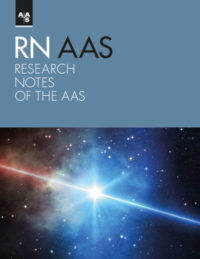Research News
-

Air quality and health in US will improve from other nations’ actions to slow climate change
The USA will benefit from improved air quality in the future, through actions to reduce greenhouse gas (GHG) emissions both domestically and globally. That is the primary finding of new research led by the University of North Carolina at Chapel Hill (UNC), published today in the journal Environmental Research Letters. It comes following the decision […]
-

Study: Air pollution battle is crucial to China’s public health
China’s measures to improve air quality are working, but more stringent policies should be put in place to safeguard public health, a new study has shown. Air pollution in China, especially in mega-metropolitan areas, is a matter of concern due to its impact on public health. The study, from Tsinghua University, Beijing, used satellite-derived aerosol […]
-

Research Notes of the AAS are back and better than ever
The American Astronomical Society (AAS) and its publications partner the Institute of Physics (IOP) Publishing announce the return of Research Notes of the AAS (RNAAS) – short communications for the rapid publication and distribution of new and exciting results. Last published in print in the 1970s, RNAAS have been brought up to date for digital […]
-

A mission to Mars could make its own oxygen, thanks to plasma technology
Plasma technology could hold the key to creating a sustainable oxygen supply on Mars, a new study has found. It suggests that Mars, with its 96 per cent carbon dioxide atmosphere, has nearly ideal conditions for creating oxygen from CO2 through a process known as decomposition. Published today in the journal Plasma Sources Science and […]
-

Cutting food waste helps improve your ‘foodprint’
Around a third of the resources used to produce the US’s food are wasted through food loss and waste (FLW), a new study has revealed. The research from the University of Texas at Austin and Sustainable America, published today in the journal Environmental Research Letters, examined the environmental impacts of the average American’s diet and […]
-

Sustainable irrigation may harm other development goals, study shows
Pursuing sustainable irrigation, without significant irrigation efficiency gains, could negatively impact environmental and development goals in many areas of the world, a new study has found. Over-extraction of groundwater for crop irrigation is one of the main causes of groundwater depletion in regions including Mexico, North East China, northern Africa, the Middle East, and the […]
-

US stands to save billions through renewable energy usage
Rolling out and extending existing US renewable energy standards nationwide could save hundreds of billions of dollars in health and environmental costs by 2050, a new study has found. The researchers from the Lawrence Berkeley National Laboratory, California, and the National Renewable Energy Laboratory, Colorado, found that the air quality and climate change mitigation benefits […]
-

Cost-effective quantum moves a step closer
Canadian and US researchers have taken an important step towards enabling quantum networks to be cost-effective and truly secure from attack. The experiments, by the team from the University of Calgary, the California Institute of Technology and the National Institute of Standards and Technology, Colorado, prove the viability of a measurement-device-independent quantum key distribution (QKD) […]







